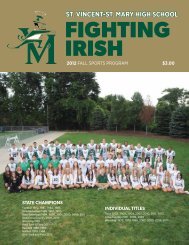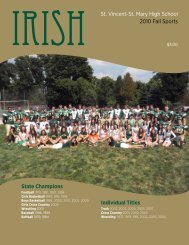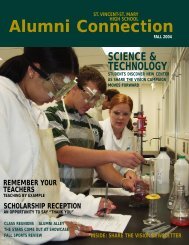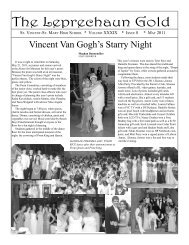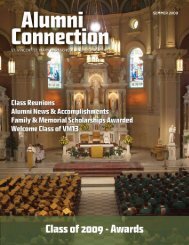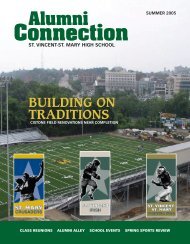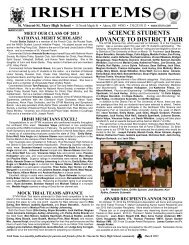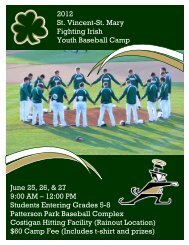The Leprechaun Gold - St. Vincent-St. Mary High School
The Leprechaun Gold - St. Vincent-St. Mary High School
The Leprechaun Gold - St. Vincent-St. Mary High School
You also want an ePaper? Increase the reach of your titles
YUMPU automatically turns print PDFs into web optimized ePapers that Google loves.
<strong>School</strong><br />
<strong>Leprechaun</strong> <strong>Gold</strong><br />
<strong>St</strong>. <strong>Vincent</strong>-<strong>St</strong>. <strong>Mary</strong> <strong>High</strong> <strong>School</strong><br />
15 North Maple <strong>St</strong>reet<br />
Akron, Ohio 44303<br />
On the Web: www.stvm.com<br />
Advisor<br />
Mrs. Maureen Harrigal<br />
Assistant<br />
Mrs. Barbara Wood<br />
Co-Editors-in-Chief<br />
Meghan Dannemiller<br />
Jackson Ewing<br />
<strong>St</strong>aff Reporters<br />
Ian Edgley<br />
Mandy Sollenberger<br />
Erica Bratton<br />
Kristen Bratton<br />
Erin Farrell<br />
Kelly Lauck<br />
Connor Wallace<br />
Brianna McVicker<br />
Photos<br />
Yearbook <strong>St</strong>aff<br />
Mrs. Beth Dolan<br />
Mrs. Patty Burdon (front cover)<br />
AN IRISH PRAYER<br />
May the road rise ever<br />
to meet you<br />
May the wind be<br />
ever at your back<br />
May the sun shine<br />
warm upon your face<br />
May the rain fall<br />
soft upon your fields<br />
And until we meet again,<br />
May God hold you in the<br />
Palm of His hand.<br />
<strong>The</strong> <strong>Leprechaun</strong> <strong>Gold</strong> is published throughout<br />
the year for the students of <strong>St</strong>. <strong>Vincent</strong>-<strong>St</strong>. <strong>Mary</strong><br />
<strong>High</strong> <strong>School</strong>. <strong>The</strong>re is no charge for the paper<br />
but donations are accepted and appreciated.<br />
Unsigned editorials represent the consensus<br />
of the editorial board. Letters to the editor<br />
are encouraged, provided they do not contain<br />
material disruptive to the educational process<br />
and that they are signed. <strong>The</strong> <strong>Leprechaun</strong> <strong>Gold</strong><br />
reserves the right to edit submitted material<br />
for length.<br />
<strong>Leprechaun</strong> <strong>Gold</strong><br />
Summer reading debated<br />
Jackson Ewing<br />
Co-Editor-in-chief<br />
“PRO”<br />
Summer reading, while it may seem tedious<br />
and boring to some students, is something that<br />
many experts feel is necessary. Many studies<br />
about summer assignments have been conducted,<br />
and summer reading is something that they feel<br />
is vital to a student’s development.<br />
Mark Bauerlein, a professor of English at<br />
Emory University, finds that summer reading is<br />
absolutely necessary. Bauerlein believes that not<br />
only is the time for summer break too long to<br />
retain knowledge, but students’ attitudes toward<br />
school also come into play. “<strong>The</strong> reason stems<br />
not only from the brain drain of summer and the<br />
fog of texting that enwraps youths during leisure<br />
hours but relates also to an attitude young people<br />
take toward education. In a word, they regard<br />
learning as a classroom thing, that’s all.”<br />
Bauerlein cites the 2007 American Freshman<br />
Survey as proof of students’ attitudes towards<br />
learning being a problem. In the survey, it was<br />
revealed that the rate of high school seniors<br />
who went to college and talked to teachers less<br />
than one hour per week came in at 53.4 percent.<br />
Bauerlein argues that this survey shows that<br />
students’ attitudes toward work are only to<br />
get a good grade on the assignment and not to<br />
retain or completely understand the material.<br />
“<strong>The</strong> outcome is unsurprising,” Bauerlein said.<br />
“Once the assignment is finished and class<br />
ends — poof! <strong>The</strong> knowledge goes away. It’s<br />
done its work.” This, according to Bauerlein,<br />
can be changed by incorporating education<br />
into student’s lives, especially outside of the<br />
classroom.<br />
Other educators feel that summer reading<br />
Ian Edgley<br />
stafff reporter<br />
It’s the night before school and rather than<br />
enjoying the last hours of freedom, students are<br />
reading some awful book and answering a seemingly<br />
endless packet of questions at 3:00 a.m.<br />
<strong>The</strong>y sit at their computers, tired and exhausted,<br />
and wonder, “Why am I doing this? This is a<br />
waste of my time.”<br />
Unfortunately, almost all schools from Alaska<br />
to Hawaii require summer reading, claiming<br />
that summer assignments lessen the amount of<br />
information lost over a summer.<br />
Nancy Kalish, co-author of “<strong>The</strong> Case<br />
Against Homework” states, “<strong>The</strong> truth is,<br />
homework doesn’t accomplish what we assume<br />
it does. According to a Duke University review<br />
of more than 175 studies, there is little or no<br />
correlation between homework and standardized<br />
test scores or long-term achievement in elementary<br />
school, and only a moderate correlation in<br />
“Con”<br />
is important as well. Richard Allington,<br />
a professor of Reading Education at the<br />
University of Tennessee, says that reading<br />
during the summer is important. “Every<br />
summer the lack of reading practice produces<br />
losses in reading proficiency, while doing<br />
some reading during the summer produces<br />
small gains.” According to Allington,<br />
research shows that students who do not read<br />
during the summer are losing three months of<br />
reading proficiency. This can lead to falling<br />
years behind in the future.<br />
<strong>The</strong>re have been many studies as to<br />
the effectiveness of summer reading and<br />
homework in general, and many experts in<br />
education feel that the two are necessary for<br />
students to expand their knowledge. Many<br />
educators say that summer homework is<br />
something that can greatly benefit a student’s<br />
education by taking education out of the<br />
classroom and keeping the skills used in<br />
school in use.<br />
“I thought <strong>The</strong> Curious Incident of the<br />
Dog in the Night Time was a very good<br />
choice for a summer reading book. It was<br />
really interesting and I’m glad I read it,” said<br />
junior Leah Tomazic.<br />
Senior Brigid Graham thought, “Tuesday’s<br />
with Morrie was a great book. I loved that<br />
it was a true story and how the reader could<br />
relate to the characters.”<br />
“I loved reading Tuesday’s With Morrie.<br />
It was full of life lessons and how to express<br />
emotions. I absolutely adore the kind of<br />
person Morrie was. He made me feel warm<br />
and loved,” stated senior Sierah Kaalima.<br />
middle school.”<br />
Duke analyzed the effect of homework on<br />
students in a 16-year long study titled, “Does<br />
Homework Improve Academic Achievement?”<br />
Many studies claim that students lose<br />
skills they don’t practice over the summer.<br />
“However,” Kadish insists, “ if a child<br />
can’t regain his grasp of fractions with a<br />
brief review, maybe those skills weren’t<br />
taught well enough in the first place. Doing a<br />
mountain of math sheets without a teacher’s<br />
help — and perhaps incorrectly — is not the<br />
answer.<br />
Worst of all, summer reading affects how<br />
children view learning. Do teachers want<br />
their students ready to start the year refreshed<br />
and ready to learn, or burned out and resentful<br />
from the last week they have dedicated<br />
to their summer assignments? It’s something<br />
that every teacher should consider.<br />
2 September 2011




